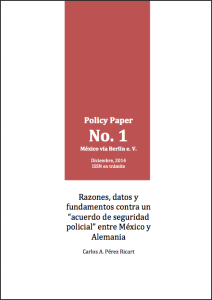 Razones, datos y fundamentos contra un “acuerdo de seguridad policial” entre México y Alemania
Razones, datos y fundamentos contra un “acuerdo de seguridad policial” entre México y Alemania
Carlos A. Pérez Ricart
México vía Berlín e. V.
Serie: Policy Papers Nr. 1.
Diciembre, 2014.
Resumen
Ante la falta de documentos que hayan explorado el tema con profundidad, el texto pretende sistematizar las razones y fundamentos por las cuales un acuerdo de seguridad policial entre México y Alemania debería ser rechazado por el parlamento alemán. El artículo hace tres contribuciones principales. Por un lado, nutre de argumentos a la oposición partidista y no partidista de ambos países formada en contra de dicho convenio; por otro lado, explora los intereses económicos y políticos específicos de ambos gobiernos por suscribir el acuerdo. Por último hace una reflexión más amplia sobre los motivos que tienen los Estados hegemónicos por concretar este tipo de colaboración así como los riesgos inherentes para los países receptores.
Zusammenfassung
Angesichts des Mangels an Publikationen, welche sich genauer mit dem Thema auseinandersetzen, ist es das Ziel dieses Textes die Gründe und Argumente ein Polizei- Sicherheitsabkommen zwischen Mexiko und Deutschland abzulehnen, zu untersuchen. Der Artikel leistet drei wichtige Beiträge. Zum einen speist er sich aus Argumenten der parlamentarischen und außerparlamentarischen Opposition in beiden Ländern gegen das besagte Abkommen; zum anderen untersucht er die ökonomischen und politischen Interessen beider Regierungen einen solchen Vertrag zu unterschreiben. Abschließend wird auf die allgemeinen Beweggründe hegemonischer Staaten, Abkommen dieser Art zu schließen, sowie die damit verbundenen Risiken für die empfangenden Länder eingegangen.
Summary
Due to the lack of documents analysing this topic in depth, this text aims to systematize the grounds and arguments because of which a police security agreement between Mexico and Germany should be rejected by the German parliament. The article makes three main contributions. On the one hand, it provides arguments to party and non-party opposition of both countries against the agreement. On the other hand, it explores the specific economic and political interests of both governments for signing it. Finally, the article reflects more broadly on the reasons for hegemonic states to put these kinds of cooperation into effect as well as on the risks these entail for recipient countries.
